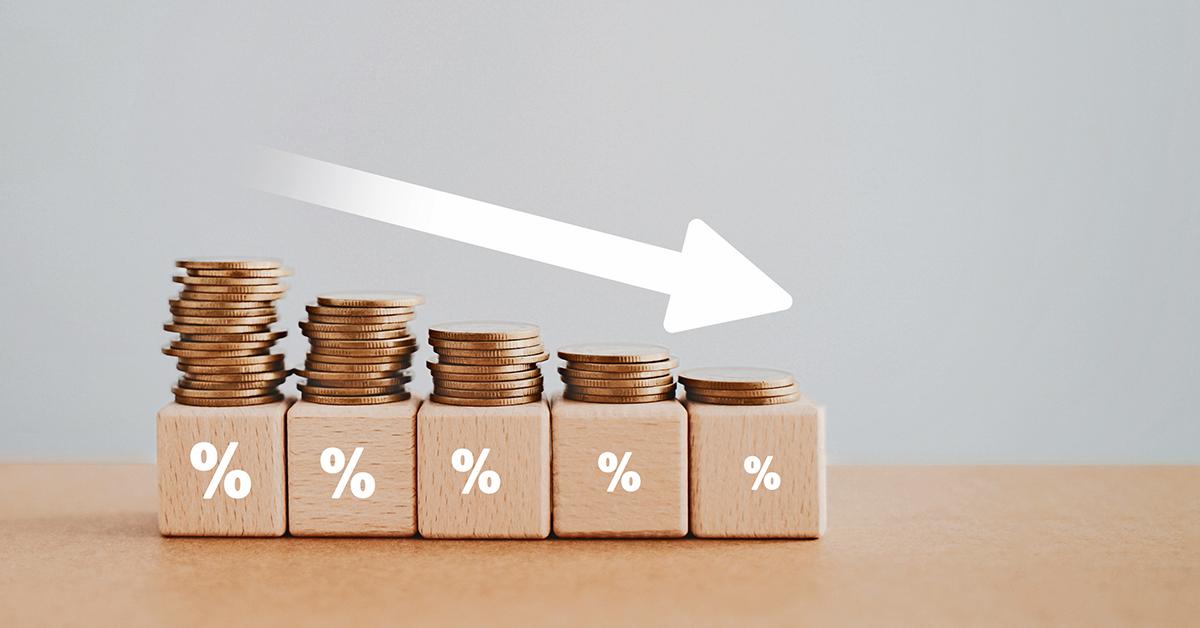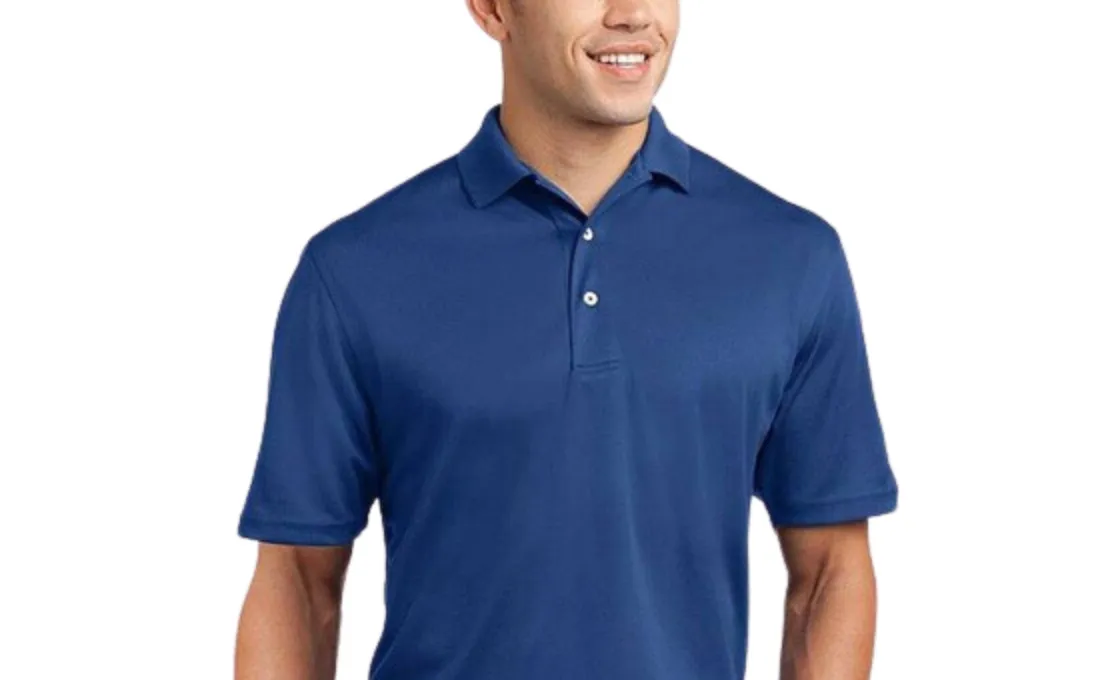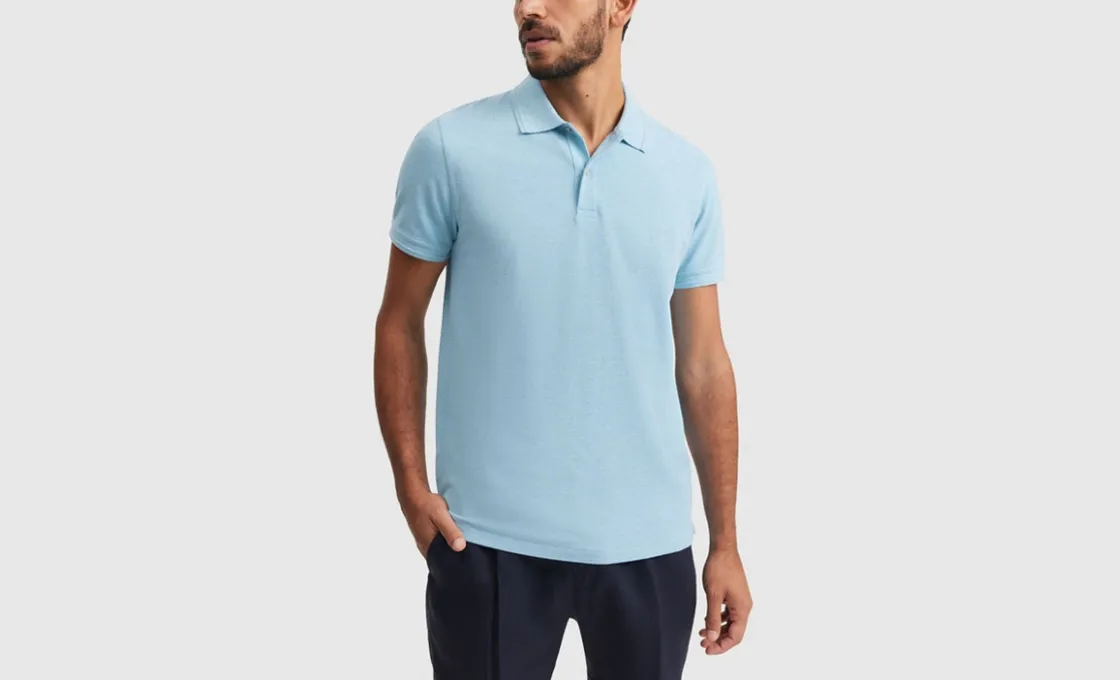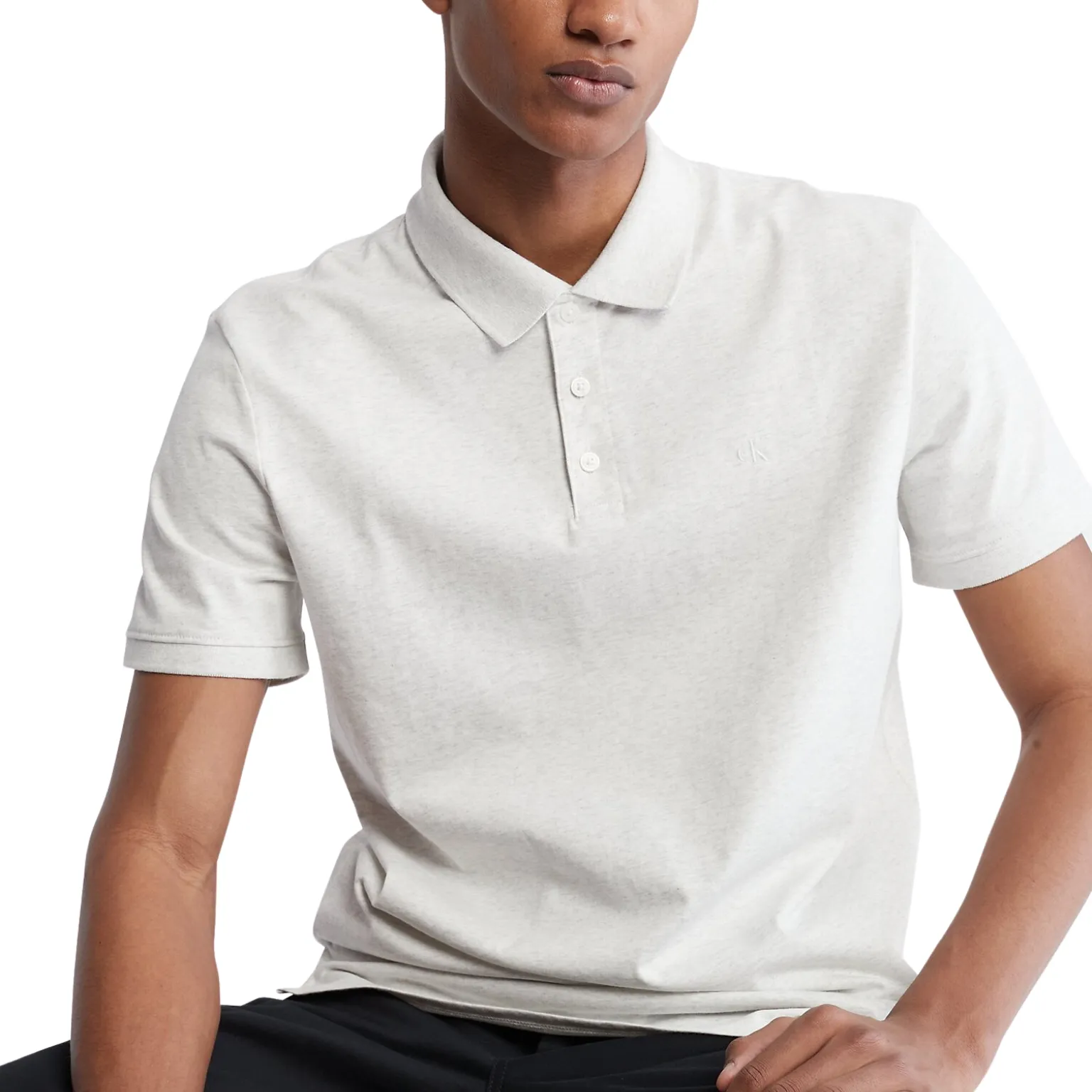Vietnam has become a key hub in the global garment industry, renowned for its skilled workforce and cost-effective production. However, many international fashion brands are still grappling with the question: “Are clothes made in Vietnam ethical?”. This overview covers the state of ethical manufacturing in Vietnam and highlights the top 5 ethical clothing manufacturers.
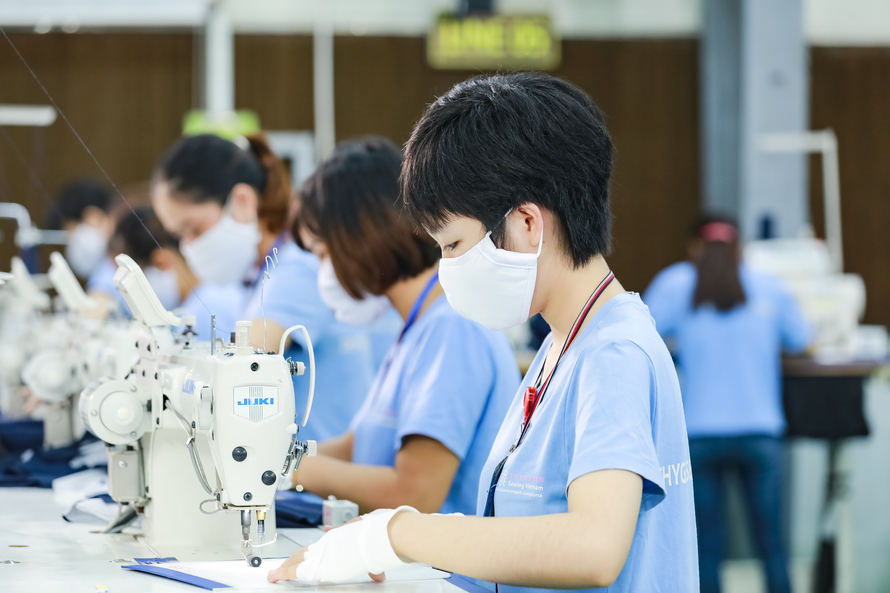
1. Ethical manufacturing practices in Vietnam
Clothes made in Vietnam are becoming increasingly ethical due to significant improvements in labor practices and sustainability.
In Vietnam, Better Work (a global program that aims to improve working conditions and promote fair labor practices in the garment and footwear industries) has been active since July 2009, collaborating with garment and footwear factories to improve labor standards, promote compliance with international labor rights, and enhance productivity.
According to Better Work, the program currently engages around 400 factories and nearly 700,000 workers, with a strong focus on empowering women, who make up 78% of the workforce in the garment sector.
Several clothing manufacturers in Vietnam are currently prioritizing ethical practices such as: fair wages, safe working environments, no child or forced labor, and sustainable manufacturing processes. These efforts show that clothing produced in Vietnam is not only high-quality but also ethically made.
1.1. Fair wages and safe working conditions for workers
Many ethical clothing manufacturers in Vietnam are focusing on fair wages and safe working conditions for their employees. Workers are paid competitive wages that meet or exceed industry standards, allowing them to support themselves and their families. Besides, working hours and overtime pay are clearly agreed upon and fully compensated, ensuring transparency and fairness in all aspects of labor.
In terms of safety, factories provide essential protective gear, including gloves, face masks, safety goggles, ear protection, and protective footwear, to prevent accidents and exposure to harmful substances.
Additionally, employees are given sufficient time for lunch breaks to maintain their well-being. Factories implement proper ventilation, fire safety protocols, and ergonomic workspaces to further safeguard workers’ health.
Thygesen Textile Vietnam is a clothing manufacturer that prioritizes safety and well-being, taking all these factors into consideration to support employees.
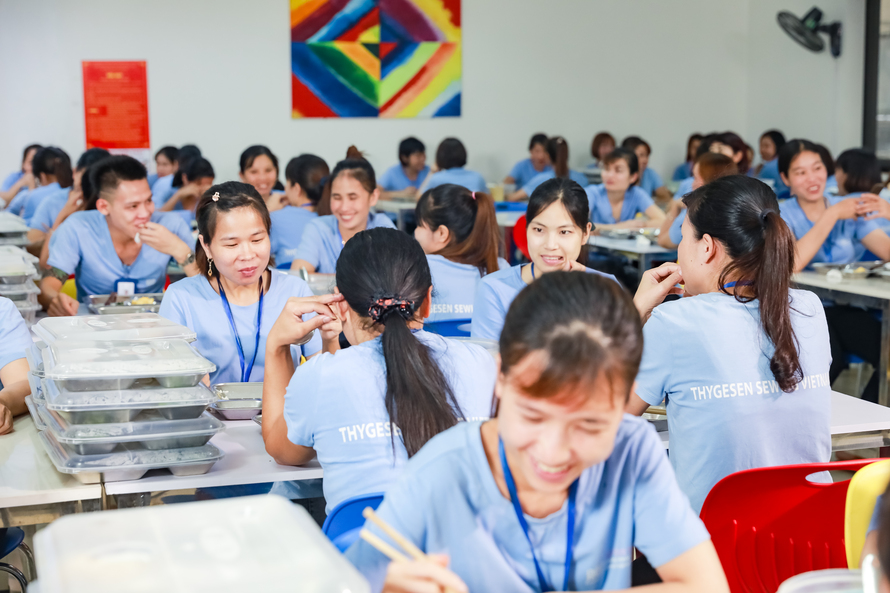
1.2. Compliance with no child and forced labor laws
Ethical clothing manufacturers in Vietnam strictly assure that no child labor is used, and all workers are above the legal working age. Vietnam garment factories uphold the highest standards by prohibiting the employment of minors, adhering to both local laws and international labor regulations.
Manufacturers are committed to creating a safe and ethical work environment, guaranteeing that all workers are employed voluntarily and with full legal consent. Regular checks by local authorities or external auditors include reviewing employee records, checking recruitment procedures, interviewing workers, and tracking any reported violations to verify compliance and reinforce commitment to fair labor practices.
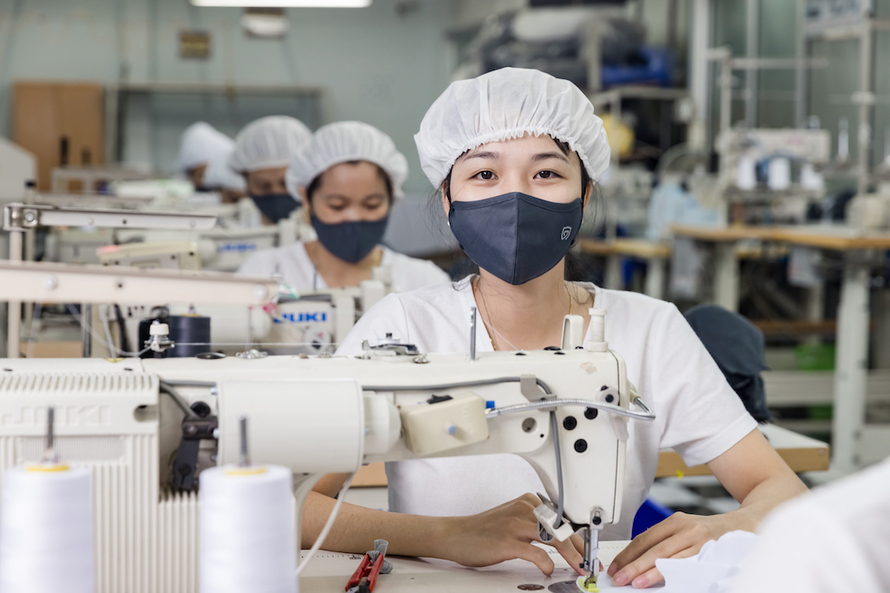
1.3. Sustainable manufacturing processes
Sustainable clothing manufacturing in Vietnam includes efforts to save energy and water, with factories adopting energy-efficient technologies and optimizing water usage to reduce waste. At Thygesen Textile Vietnam, we apply LEAN principles at every step of manufacturing to improve operations, reduce waste, and lower environmental impact.
Factories also follow strict waste disposal regulations, ensuring proper management of waste and minimizing air emissions by carefully managing chemicals during production. Recycling is a key focus, with many manufacturers using recycled materials and eco-friendly fabrics like organic cotton and bamboo.
Additionally, factories reduce packaging waste by encouraging the use of recycled paper bags instead of plastic. These efforts highlight the growing commitment to sustainability and efficiency within Vietnam’s garment industry.
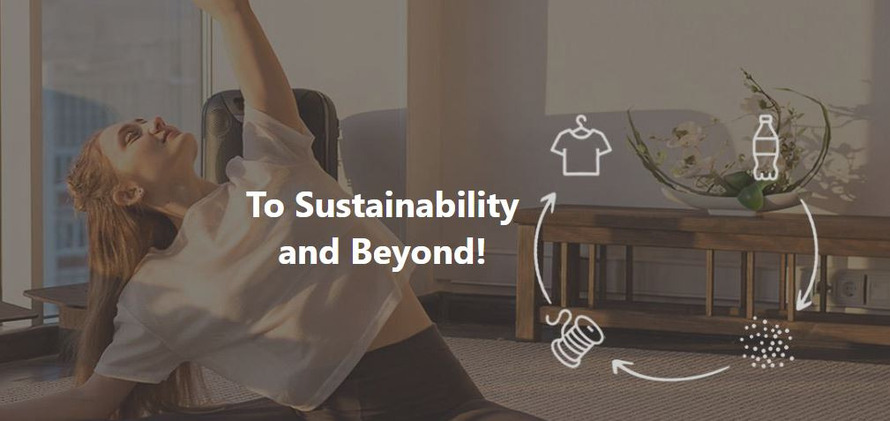
1.4. Enhanced transparency in operations
In Vietnam, many ethical clothing manufacturers prioritize transparency and open communication with their clients throughout the production process. They emphasize clear, honest interactions, ensuring that clients are well-informed about every step of the manufacturing journey or any issues that may arise.
Moreover, many Vietnamese factories are open to third-party inspections to verify the quality of their processes. Brands are welcome to invite independent auditors to assess the production and ensure it aligns with agreed-upon standards.
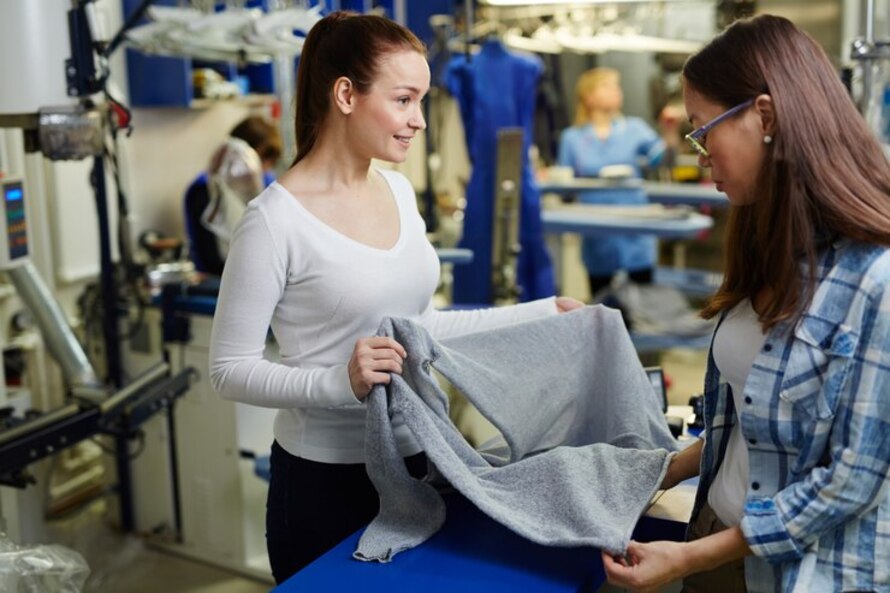
1.5. Ethical and sustainable sourcing of materials
Ethical and sustainable sourcing of materials is a key focus for many clothing manufacturers in Vietnam, as it aligns with the growing demand from fashion brands for responsible production practices.
Many Vietnam clothing manufacturers commit to using responsibly sourced materials, prioritizing eco-friendly options such as organic cotton, recycled fabrics, and other sustainable materials.
These manufacturers can produce materials in-house, ensuring that their facilities, processes, and raw materials meet strict quality and sustainability standards. Alternatively, they source from reliable local and international suppliers who provide clear documentation, including origin certificates, invoices, and other proof of traceability.
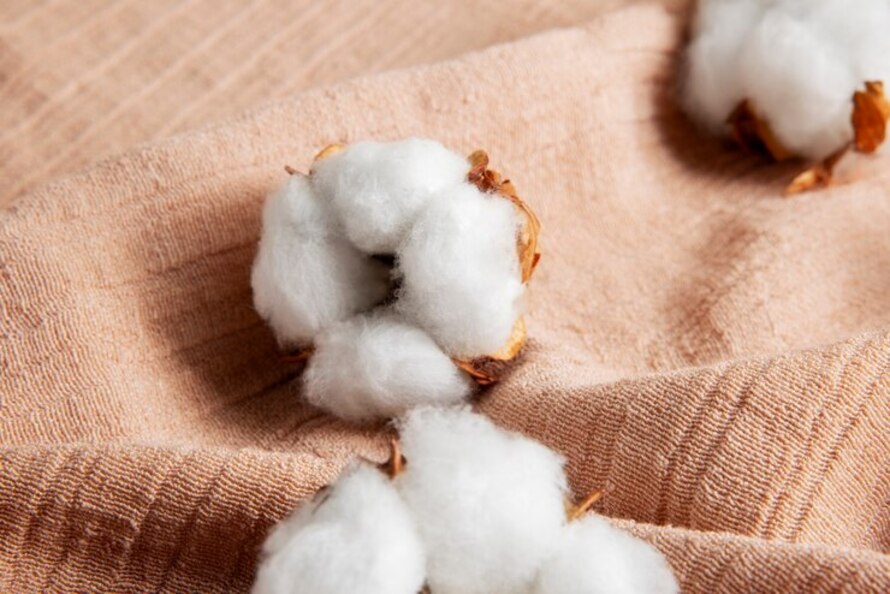
2. How to find an ethical clothing manufacturer in Vietnam
To find an ethical clothing manufacturer in Vietnam, you can start by gathering general information about the manufacturer, verify their practices, and finally visit the factory for a firsthand look at their operations. Scroll down for more details below.
2.1. Prioritize ethical certifications
There are several key ethical certifications you should check when evaluating a clothing manufacturer in Vietnam. SA8000, WRAP, and Better Work highlight ethical labor practices, such as fair treatment of workers, safe working conditions, and the prohibition of child or forced labor.
For environmentally responsible manufacturing, look for GOTS and Oeko-Tex. GOTS ( Global Organic Textile) covers the entire process for textiles made from organic fibers, while Oeko-Tex guarantees fabrics are free from harmful substances. Additionally, certifications like OCS (Organic Content Standard), GRS (Global Recycled Standard), and FSC (Forest Stewardship Council) reflect commitments to organic materials, the use of recycled materials, and sustainable forestry. These certifications demonstrate a manufacturer’s dedication to transparency, sustainability, and ethical production standards.
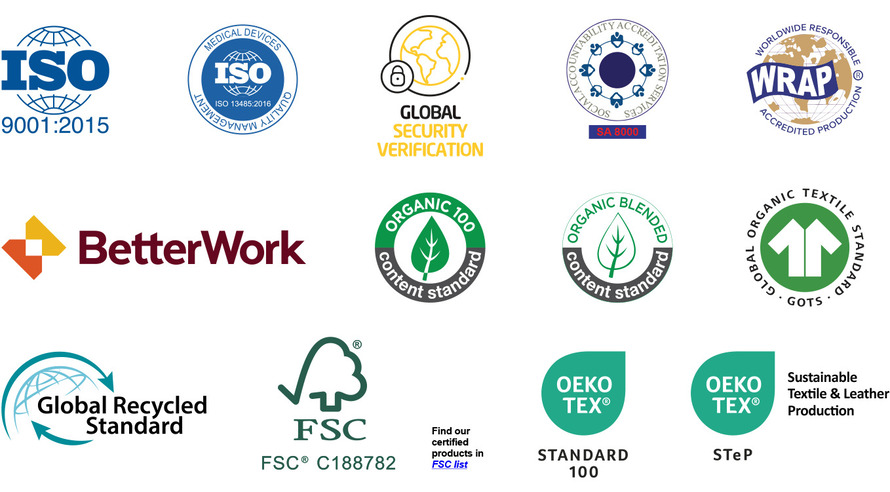
2.2. Verify transparency
When selecting a clothing manufacturer, it’s crucial to choose companies that are transparent about their operations. Manufacturers should provide clear and detailed information about how they work with their supplier partners in sourcing fabrics and accessories, production processes, and labor practices.
Moreover, look for garment manufacturers who openly share details about their suppliers, subcontractors, and factory conditions. Additionally, check if they are willing to disclose information about audits or certifications they’ve undergone, as this can provide further assurance that they meet established ethical and environmental standards.

2.3. Conduct thorough research on company ethics
To assess a manufacturer’s ethics, conduct thorough research across various sources. Review their portfolio, customer feedback, and staff reviews on independent platforms. These unfiltered reviews offer valuable insights into product quality, functionality, working conditions, and the authenticity of the company’s ethical claims.
However, be cautious when reading reviews, as some information may be one-sided, biased, or even seeded. It’s important to cross-check multiple sources to get a more accurate and balanced view of the manufacturer’s true ethical standards and practices.

2.4. Take a factory tour
Visiting a manufacturer’s factory is an essential step in the verification process. It allows you to gain firsthand insight into their facility, labor conditions, and overall operations. During the tour, observe the working environment, safety measures, and how workers are treated.
If an in-person visit isn’t possible, consider hiring a third-party to inspect the factory. This can help assess labor standards, ethical practices, and sustainability efforts to confirm that the clothing manufacturer aligns with your values and requirements.
In regions with many clothing factories, like Binh Duong, Nam Dinh, Thanh Hoa, and Ho Chi Minh City, many agencies can assist with factory inspections and provide detailed reports.
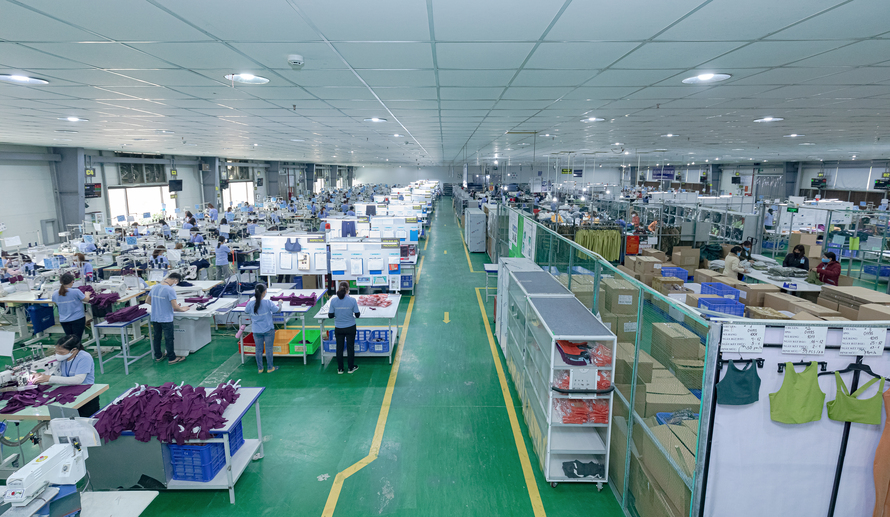
3. Top 5 ethical clothing manufacturers in Vietnam
Here is a list of ethical clothing manufacturers in Vietnam that you can consider for your sourcing needs. These factories are known for their commitment to ethical practices, sustainability, and high-quality production standards.
Clothing manufacturers | Services and Certificates | Contact Information |
| Thygesen Textile Vietnam | Thygesen is a Vietnam clothing manufacturer that focuses on ethical practices and responsible product creation.Specializing in Activewear, Underwear, Casualwear, Kidswear, Workwear, and Uniforms, its key customers include Calvin Klein, Tommy Hilfiger, Fjällräven, DKNY, Girlfriend Collective, and Boody. The company prioritizes environmental sustainability through eco-friendly production methods and is committed to social sustainability by guaranteeing safe working conditions and fair labor practices. Thygesen holds certifications such as SA8000, ISO 9001, ISO 14001, OEKO-TEX® Standard 100, and GOTS, OCS, GRS, FSC. | Email: [email protected]: (+84) 963 009 993 Website: thygesenapparel.com Address: 9th Floor, Vinafor Building, 127 Lo Duc Street, Hai Ba Trung District, Hanoi, Vietnam |
| Hung Long | Hung Long is a garment manufacturer in Vietnam, specializing in jackets, trousers, children’s clothing, robes, and swimwear for men, women, and children.The company exports primarily to markets in the USA, Europe, Japan, and South Korea, and holds key ethical certifications, including WRAP, GSV, and Better Work, demonstrating its commitment to ethical production and labor standards. | Email: [email protected]: (+84) 221 3508 159 Website: http://mayhunglong.vn/ Address: Di Su Ward, My Hao Town, Hung Yen Province, Vietnam. |
| Maxport Limited Vietnam | Maxport Limited Vietnam is one of the biggest manufacturers specializing in activewear for global brands like Nike, Lululemon, Asics, and Gymshark.The company places a strong emphasis on both social and environmental sustainability, adhering to Vietnam’s labor code while offering competitive worker benefits, including fair pay, bonuses, and health insurance. Maxport’s commitment to ethical practices and sustainable production makes it a reliable partner for companies seeking high-quality activewear. | Hotline: (+84) 0243 558 0941Website: https://maxportlimited.com/ Address:No 88 Ha Dinh street Thanh Xuan District, Hanoi |
| TCE Denim | TCE has two factories in Vietnam, specializing in sustainable denim production. As a leading vertically integrated supplier in Southeast Asia, TCE focuses on eco-friendly practices, including water-saving dyeing methods, one-bath sulfur dyeing, and aniline-free indigo dyeing.The company also uses an eco-friendly sanforizing finishing machine, reducing energy, water, and gas emissions. TCEDenim holds several certifications related to sustainability and ethical practices, including Higg Index, OEKO-TEX® Standard 100, GRS, RCS, GOTS, OCS, BCI. | Email: [email protected] Hotline: (+84) 350 3677025Website: http://tcedenim.comAddress: Hoang Hoa District, Thanh Hoa Province, Vietnam |
| Bao Minh | Bao Minh, a subsidiary of Thien Nam Thinh Vuong Group (TNP Group), is one of Vietnam’s largest textile manufacturers with a fully integrated supply chain, covering everything from fiber production to garment manufacturing. The company is committed to sustainability and ethical practices, holding certifications such as Higg Index, GRS, OCS, RCS, GOTS, Oeko-Tex® Standard 100, | Email: [email protected] Hotline: (+84) 0228 625 3333Website: https://www.baominhtextile.com/Address: Bao Minh Industrial Zone, Thanh Loi Commune, Vu Ban District, Nam Dinh Province, Vietnam. |
The above clothing manufacturers, with their certifications and trusted partnerships with leading global brands, meet the highest ethical production standards. If you’re looking for an ethical clothing manufacturer for your brand, these are potential partners to consider.
4. FAQs
Can clothing manufacturers in Vietnam meet the brand’s required lead time without compromising ethical standards?
Most clothing manufacturers in Vietnam can meet brand requirements for lead times without compromising ethical standards, but there are risks involved, especially for large order volumes. When brands demand high volumes within short timeframes, manufacturers may outsource production or require workers to work excessive overtime. This can lead to some problems, including:
- Health and Well-being Risks: Continuous overtime and lack of rest can result in fatigue, physical strain, and mental health issues among workers.
- Quality Issues: Rushed production may lead to compromises in product quality, as workers may be unable to meet the usual standards when under pressure.
- Ethical Concerns: Outsourcing to factories with lower standards or exploiting workers can violate ethical manufacturing principles.
Brands should assess the manufacturer’s capacity, negotiate realistic lead times, and carefully monitor and audit production processes to maintain ethical standards.
How does ethical manufacturing affect production costs?
Ethical manufacturing affects production costs in some ways both directly and indirectly. In the short term, these factors increase costs, but they can bring long-term savings, environmental benefits, and improved brand value later.
- Higher Labor Costs: Fair wages, benefits, and safe working conditions increase labor expenses, along with investments in training and skill development.
- Sustainable Materials: Eco-friendly materials like organic cotton or recycled fabrics often come with higher upfront costs due to sustainable sourcing.
- Certifications and Compliance: Achieving certifications like ISO 9001 or GOTS involves audits, documentation, and compliance costs.
- Energy & Resource Efficiency: Investments in efficient technologies (e.g., water-saving dyeing or renewable energy) increase costs but offer long-term savings.
Can Vietnamese clothing manufacturers produce sustainable and recycled fabrics?
With advanced skills and developing technologies, many factories in Vietnam are well-equipped to produce sustainable and recycled fabrics. These factories utilize cutting-edge techniques in fiber production, yarn spinning, weaving, and dyeing to integrate eco-friendly practices throughout the entire production process. With a focus on sustainability, they can efficiently handle the production of recycled materials, such as recycled polyester and organic fibers, ensuring that these fabrics meet global environmental standards while maintaining high quality.
What policies has Vietnam implemented to promote ethical production in the garment industry?
Vietnam has implemented to promote ethical production in the garment industry:
- Labor Laws: Vietnam has strengthened labor laws to ensure fair wages, safe working conditions, and workers’ rights to unionize, in line with ILO conventions.
- Environmental Regulations: Stricter laws promote sustainable practices, focusing on waste management, water usage, and energy efficiency in garment manufacturing.
- Trade Agreements (EVFTA & CPTPP): Agreements like EVFTA and CPTPP require compliance with high standards for labor rights, environmental protection, and anti-corruption.
- Sustainability Certifications: The government encourages adopting global certifications (e.g., ISO 9001, GOTS, SA8000) to meet ethical and environmental standards.
- Green Technology Incentives: Financial incentives support manufacturers investing in energy-efficient and environmentally friendly production technologies.
In conclusion, the question “Are clothes made in Vietnam ethical?” is being answered with growing certainty, as more manufacturers prioritize ethical practices and sustainability, making Vietnam a key destination for global ethical fashion brands in the region.
For those seeking a trusted partner in ethical manufacturing, Thygesen Textile Vietnam upholds a strong commitment to ethical manufacturing practices, focusing on fair wages, safe working conditions, and sustainable production. For collaboration inquiries, please contact [email protected] or visit thygesenapparel.com.






